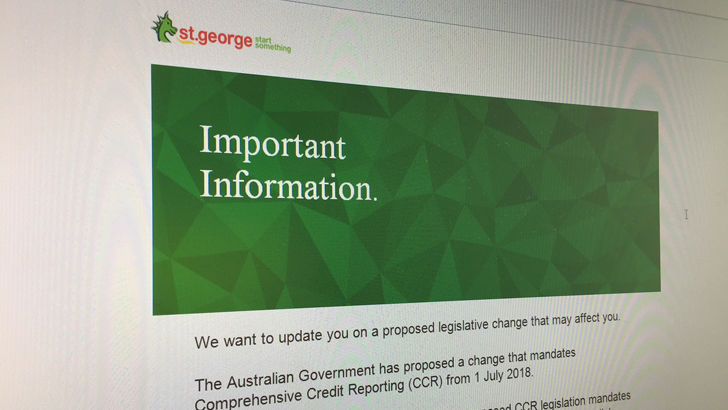New credit reporting rules mean defaulting is no longer a disaster
By Mike Laing
Australia's credit reporting system is changing - here's what you need to know
You may have seen references in the papers to "comprehensive credit reporting" or even received a notice from your bank about changes to the credit reporting system in Australia.
But what does it all mean?
Whether you are buying a home, growing your business, or taking an overseas holiday, many of life's big moments can depend on gaining access to credit when you need it.
A key component lenders use when determining whether you are approved for a loan and how much you can borrow is your credit report, which sets out your previous credit applications and any defaults on your payments.
Australia is currently moving to a new system of credit reporting that will help reward people who pay off their debts on time.

What is changing?
Following industry-wide changes, your credit report will soon show a much more comprehensive picture of your credit health and your ability to pay your debts.
In the past, your credit report included whether you had a default-meaning you had fallen more than 60 days behind with a repayment- but now it can also tell lenders how much debt you have, how well you pay your accounts and that you manage your debt responsibly.
How can I benefit?
Consumers who have been diligent in making their repayments on time may be able to borrow more money, and at a lower interest rate than before.
People with little credit history previously may now find it easier to get a loan, because lenders can see that they have been regular with repayments on a credit card or a home loan obtained years earlier.
Another major advantage of the new system is that it need not be a disaster anymore if you have a default.
Although a default stays on your credit report for five years, if you keep paying your other debts on time after the default, lenders will be able to see that you are now managing your loans.
What should I do?
Check on your credit report regularly. Everyone can obtain a free copy once a year from one of the credit reporting bodies - Equifax, Experian, and Illion.
If you see anything wrong with your credit report, you can contact your lender or a credit reporting body, so that any errors can be corrected.
You can check your credit score, monthly, through one of the various free credit score websites. Your credit score is a numerical expression of your credit health based on the data in your credit report.
However, be aware that individual lenders will have their own way of calculating credit scores, which will take account of other information such as your income, and the size of the loan you are applying for.
It's now more important than ever to pay your debts on time, and if you do, this will be reflected favorably on your credit report. You can find out more about comprehensive credit reporting at CreditSmart website.
Get stories like this in our newsletters.



